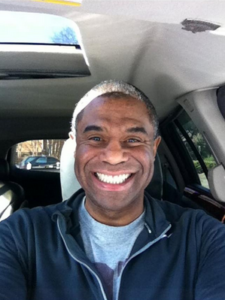I have specialized in Orofacial Myofunctional Therapy since 1977 and I feel one of the reasons I have been so successful for 40 years is because I document my patient’s progress through photographs (and videos).
To me, the reason why photographs are so important is not only for proof that Orofacial Myofunctional Therapy (OMT) works (and it does!) – but also because it’s a great motivator for my patients because the progress made in OMT is so gradual. It’s not like getting a haircut while one sits passively in a chair reading a magazine and an hour later, leaves the salon looking different. In OMT, there is a gradual progression of improvement.
There is also no magic wand. To be successful in OMT requires a lot of hard work on the part of the patient by not only practicing exercises everyday but they must be compliant in following the Allergist and Ear, Nose and Throat doctors’ recommendations since nasal airway interference is the primary CAUSE of Orofacial Myofunctional Disorders (OMDs). All of my patients are referred to an Allergist and ENT that understand OMDs before I initiate OMT since nasal airway interference is the CAUSE and OMT is treating the EFFECT. I never want to get so caught up in treating the EFFECT that I ignore the CAUSE.
I have found Allergies are much more prevalent than structural nasal obstructions like enlarged tonsils and adenoids, etc. which is why a referral to an ENT AND Allergist is so important. Allergies are considered a Chronic Disease because there is no cure. The patient must learn how to control their allergies and the Allergist I refer them to is an expert at teaching my patients how to control their allergies.
Once the patient and parent understands the importance of achieving a patent nasal airway consistently and have followed the recommendations of the Allergist and ENT, the patient is enrolled in OMT at my clinic.
I have 3 OMT programs:
- A sucking elimination therapy program to eliminate any non-nutritive sucking habits.
- A mini-orofacial myofunctional therapy program for 5 year olds to 10 or 11 year olds that concentrates on lip competence.
- A formal orofacial myofunctional therapy program for 11-12 year olds to adults.
Here’s an example of why I feel photographs are so important…
This patient is a 7 year old female who exhibited an incorrect oral rest posture of the tongue and lips consisting of an open mouth, low forward rest posture of the tongue against and between the teeth. As a result of the incorrect oral rest posture of the tongue and lips, she exhibited an incorrect swallowing pattern. A referral to the ENT revealed no structural obstructions but a referral to the Allergist revealed significant allergies characterized by Perennial Allergic Rhinitis with seasonal (spring/fall) exacerbation. Once she was able to breathe nasally consistently by following the Allergist’s recommendations, she was enrolled in the mini-myofunctional therapy program or lip competence therapy/program where she was seen for 16 visits over a 3 1/2 year period.
These photographs demonstrate the gradual progression that can be demonstrated in OMT…
BEFORE OMT (April, 2010)…
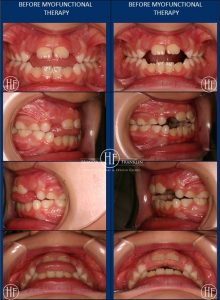
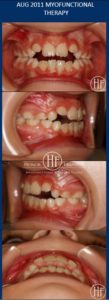
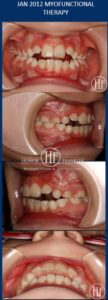
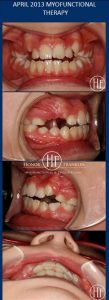
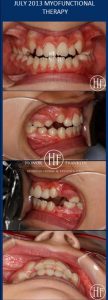
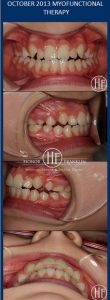
Another Example:
This 19 year old female patient was enrolled in the formal OMT program. She presented with an incorrect oral rest posture of the tongue and lips consisting of a Chronic open mouth, low, forward resting posture of her tongue against and between her teeth and, as a result of the incorrect tongue and lips, resting posture, she exhibited an incorrect swallowing pattern. A referral to the ENT revealed nasal structural obstructions that was “almost completely occluding both nasal airway” so a septoplasty and partial turbinectomy was performed. A referral to the Allergist revealed dramatic Perennial Allergic Rhinitis with seasonal (spring/summer) exacerbation. She was prescribed a saline spray, blow her nose and use Nasonex 2 sprays each nostril daily, supplement with Allegra 10mg once a day and implement pollen and dust avoidance measures. It is stressed in therapy that no one can remain in therapy at this clinic unless they are compliant in following the Allergist’s recommendations because nasal airway issues are the CAUSE of Orofacial Myofunctional Disorders (OMDs) and again, we never want to get so caught up in treating the EFFECT that we ignore the CAUSE.
She had orthodontic braces from 14 years old to 16 years old and at age 19, her orthodontist noticed her bite was opening and referred her to me.
Here are her Before and After Myofunctional Therapy photos…
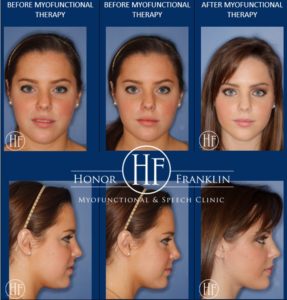
Notice the gradual improvement in her facial shape
If I didn’t take photographs…
How could I prove that orofacial myofunctional therapy works?
How could I show these patients the improvement they were making?
How could I motivate them?
Yes, without a doubt, photographs are vital for Orofacial Myofunctional Therapy!!!
NOTE: These Photographs were made with a Canon Rebel EOS 60D with a Canon Macro Ring lite (MR-14EX11).
Since 1977, Dr. Honor Franklin has specialized in the evaluation and treatment of Orofacial Myofunctional Disorders (OMDs) in children, adolescents and adults which include an incorrect oral rest posture of the tongue and lips, an incorrect swallowing pattern (known as “tongue thrust” or “tongue thrust swallowing”), prolonged non-nutritive sucking habits and articulation (speech) disorders.She holds the distinction of being a Board Certified Orofacial Myologist/Myofunctional Therapist by the International Association of Orofacial Myology (IAOM); an honor held by a small percentage of professionals practicing orofacial myofunctional therapy. In fact, she in the ONLY Certified Orofacial Myofunctional Therapist in Dallas and is only one of three in the state of Texas! In addition, as a practicing Speech-Language Pathologist, she maintains Licensure by the State of Texas and a Certificate of Clinical Competence awarded by the American Speech and Hearing Association (ASHA).
Dr. Franklin has had extensive training and experience with orofacial myofunctional disorders (OMDs) and articulation (speech) disorders and is considered an expert in these fields. She welcomes referrals from Orthodontists, Pediatric Dentists, Maxillofacial Surgeons, Dentists, Pediatricians, Internists, and Speech Language Pathologists.
Call today to schedule an appointment with Dr. Honor Franklin at Honor Franklin Myofunctional & Speech Clinic 972-233-1312
and Check Us out on Social Media:
FACEBOOK
GOOGLE+
INSTAGRAM
PINTEREST
TWITTER

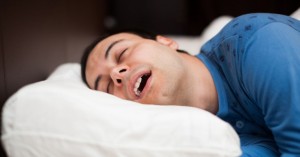








 It is well known that nasal airway problems are a the primary cause of an orofacial myofunctional disorder (OMD), so recognizing the signs of sinusitis is important.
It is well known that nasal airway problems are a the primary cause of an orofacial myofunctional disorder (OMD), so recognizing the signs of sinusitis is important.